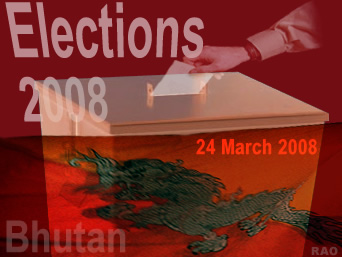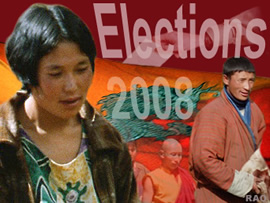| National
Assembly Elections 2008 |
 |
Bhutan Politics - Elections |
|
 |
Bhutan Politics |
 |
|
 |
|
EU
Election Observation Mission (EOM)
|
 |
 |
| Members
of an European Union Election Observation Mission (EU EOM) team have arrived
in Thimphu to observe and assess the run up to the National Assembly election
and the March 24 poll day.
Five
experts from the team reached the capital on February 22, and 10 more led
by the chief observer of the mission, Mr. Javier Pomés Ruiz, a member
of the European Parliament, will be here shortly. Nine of them will be
deployed to other parts of the country until poll day. |
|
Deputy
chief observer, Luis Martinez-Betanzos, told Kuensel that the mission provided
support to the host countries, which invited them, to hold a standard election.
"We'll
assess and monitor the election process, make sure everything is within
the constitutional framework and in accordance with regional and international
standards," he said.
The
EU EOM works independently with the mandate to conduct a comprehensive
assessment of electoral process and offers an impartial, balanced and informed
analysis of the elections.
It
assesses all aspects of the electoral process, including delimitation of
constituencies, registration of voters and candidates, training of election
staff, voter education, media coverage, campaign and the preparations for
election day, as well as the appeals process.
On
poll day, observers will visit polling stations to observe opening, voting,
counting and the aggregation of results.
The
deputy chief observer said assessment will be done in line with human rights
aspects in the election process, which includes "right to be elected" and
"right to vote".
The
mission also includes media analysts who will monitor media coverage during
the election using international methodological standards of quantitative
and qualitative analysis.
Press
expert, Andrea Malnati, said that they would monitor the main media in
the country, especially the state television, Kuzoo radio, and the three
newspapers.
"Quantitative
analysis will include details like how much time and space was allocated
to both parties and candidates, see if it is balanced, and also check the
tone of coverage towards the candidates and quality of news reported,"
he said.
The
media monitoring will inform the EU EOM on the performance of media through
regular reports and it would also form part of the overall evaluation of
the election process.
Meanwhile,
observers from different professional backgrounds from 13 member countries,
who will arrive this week, will travel to all regions of the country and
come out with an assessment.
The
deputy chief observer said that the mission will not make any statement
until the election was over and will be doing so within 48 hours after
the election.
"We're
here not to interfere with the process but to help through study and observation
and make recommendations for future elections," said Luis Martinez-Betanzos.
 |
| Contributed
by Kesang Dema, Kuensel, Bhutan's National Newspaper, March 2008 |
top
|
European
Union to observe first National Assembly Elections in the Kingdom of Bhutan
|
 |
 |
| The
European Commission will deploy a 15-member strong EU Election Observation
Mission (EOM) for the first elections of a National Assembly in Bhutan
scheduled to take place on 24 March 2008.
The
EU EOM, led by Mr. José Javier Pomés Ruiz, Member of the
European Parliament, will go out on 22 February and will stay for a period
of seven weeks on the ground. The EU attaches great importance to the process
of democratic transition in Bhutan, including the elections and the adoption
of the constitution. |
|
Benita
Ferrero-Waldner, Commissioner for External Relations and European Neighbourhood
Policy, said: "The elections for the National Assembly of the Kingdom of
Bhutan are a milestone in the country's history: they will allow the Bhutanese
people to exercise their democratic right to vote and to determine their
own future. On this basis, the new Parliament will have to enact
the new Constitution, and continue the path of democratic transition, paying
special attention to preserving the national cultural identity and values
of Bhutan."
The
National Assembly elections will be the first multi-party general elections
to take place in Bhutan, which had no parliamentary monarchy until now.
The elections are part of a gradual top-down peaceful movement to democracy
led by the monarchy. Over the last few years a written Constitution
was drafted, several new constitutional bodies were established, and the
National Council (the upper house of the Parliament) was elected. The National
Assembly elections on 24 March will now complete this process.
The
Election Observation Mission will consist of a Core Team of 6 election
experts including the Chief Observer to be deployed on 22 February 2008
to co-ordinate the assessment of the entire election process and 9 Long
Term Observers (LTOs) to be deployed one week later to assess the campaign
period, the pre-election preparations around the country and to observe
voting, counting and the tabulation of results. It is planned that the
EU EOM will remain in the country for up to 10 days after election day
to observe the post-election period.
EU
Election Observation Missions are an important instrument for building
confidence in the democratic processes of a country and are deployed in
line with the EU's commitment to promote democracy, human rights and respect
for the rule of law. The EU has made available some 1 million from the
European Initiative for Democracy and Human Rights (EIDHR), for this mission.
The
European Commission is one of Bhutan's most important development partners,
assisting the country in meeting the Millennium Development Goals by providing
support to Renewable Natural Resources, Trade Facilitation and Good Governance.
 |
| Source:
European Commission, January 2008 |
| more Information |
 |
| Links |
 |
 |
 |
External
Links |
|




